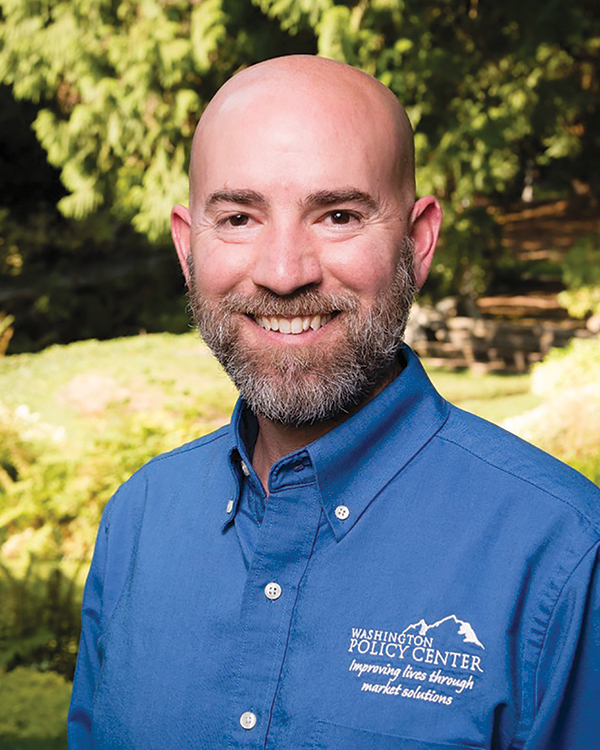
Home » Q&A with Jason Mercier
Q&A with Jason Mercier

November 15, 2021
Washington Policy Center
Government Reform Director

What is the Washington Policy Center?
Washington Policy Center (WPC) is an independent, nonprofit think tank that promotes sound public policy based on free-market solutions.
WPC improves lives of Washington state’s citizens by providing accurate, high-quality research for policymakers, the media and the general public. Headquartered in Seattle with satellite offices and full-time staff in Olympia, Spokane and the Tri-Cities, WPC publishes studies, sponsors events and conferences and educates citizens on the vital public policy issues facing our region.
Through its research centers, Washington Policy Center focuses on eight core areas of public policy: education, environment, government reform (budget & taxes, open government), health care, small business, transportation, agriculture and worker rights.
In addition, WPC operates WashingtonVotes.org, the premier website for tracking bills in Olympia, finding objective, plain-English summaries of legislation and offering quick access to your legislators’ voting records.
What is your role? How long have you been in it?
I’ve been the government reform director at WPC for 14 years. In total, I’ve been involved in this type of research and work in Washington state for more than 20 years.
Why should the Tri-Cities care about the work that you do?
Good governance is important at all levels of government.
The Center for Government Reform works toward a government focused on its core functions while improving its transparency, accountability, performance and effectiveness for taxpayers. This is true at both the state and local level.
This is why I’m happy to serve as an ex-officio for the Tri-City Regional Chamber of Commerce.
What is one characteristic that you believe every leader should possess?
The ability to delegate while being decisive. A successful leader will be determined by the competency and effectiveness of their staff. A good leader doesn’t need to micromanage staff. Empower and hold them accountable for achieving clear outcomes instead.
What is the biggest challenge facing executives, including policy makers, today?
Our current attack culture.
This is true for business leaders, policymakers and the country as a whole. We as a society seem to be going through a phase of search and destroy instead of unifying around a common goal or purpose.
Managing this troubling trend and not contributing to it is one of the largest challenges facing today’s leaders.
If you had a magic wand, what would you change about the policy world?
Facts, facts, facts.
Too many policy debates have devolved into talking points and agendas. Good policy must be grounded and based on facts and measurable objectives.
What advice would you give someone going into a leadership position for the first time?
Surround yourself with talent you feel comfortable delegating responsibility to.
Who are your role models or mentors?
President Ronald Reagan and Governor Mitch Daniels.
I appreciate principled individuals who can inspire and uplift while promoting policies to encourage individual liberty and responsible governance based on fiscal discipline and strong government accountability.
Policy shouldn’t be fear based with personal attacks or mean-spirited. The positive way that former President Reagan and Governor Daniels governed is how I hope to engage in policy debates.
How do you keep your team members motivated?
It is important for all members of your team to feel heard, respected and have ownership of the work product.
How did you decide to pursue the career that you are working in today?
I’m a problem solver by nature and enjoy diagnosing problems and finding solutions.
Politics, as we are all too aware, is incredibly frustrating. If elected officials, however, are truly interested in good governance, fact-based policy recommendations are essential to improving our state, country and lives.
That’s a role I want to help with.
How do you measure success in your workplace?
Since policy is never finished but instead ongoing, success for me is measured by the accuracy and respect of my analysis and recommendations. If I’m seen as an honest and trusted broker in the policy debate that is a successful engagement.
How do you balance work and family life?
This is the million dollar question we all struggle with. It is important to distinguish between real emergencies and other priorities that can be acted on later.
Especially in the world of policy, there is really never a completed project. The work is ongoing but time with your children is short.
I put family activities on my work calendar. Once on the calendar it helps me avoid over scheduling to free up time with family.
What do you like to do when you are not at work?
If I’m not trying to solve a policy problem, I’m hopefully instead enjoying time with my daughters and wife.
What’s your best time management strategy?
Turn the computer off and at least try to put the phone down after the workday, during the weekends, and particularly when on vacation.
Best tip to relieve stress?
Mental breaks are essential. These don’t have to be weeks’ long; it can be as simple as a 15-minute walk during the day.
What’s your favorite website?
For work I have all the state’s media outlets and major fiscal agencies webpages bookmarked to start my daily policy review.
As for the prior question on stress relief, the ESPN and NFL webpages get their frequent use as well (though sometimes that can lead to more stress if my team is having issues).
Do you have a personal mantra, phrase or quote you like to use?
My wife and children have frequently heard me say that context and perspective are everything.
Also, due to the misguided tax debate in Washington, I’ve added this quote to my email signature line: “IRS – ‘You ask whether tax on capital gains is considered an excise tax or an income tax? It is an income tax.’ ”
Q&A Local News Labor & Employment
KEYWORDS november 2021




